Desloxan 5 mg is a medication primarily prescribed to treat depression and anxiety disorders. It belongs to a class of drugs called selective serotonin reuptake inhibitors (SSRIs), helping to balance neurotransmitters in the brain. The dosage and specific usage should be determined by a healthcare professional based on individual needs and medical history.
What is Desloxan 5 mg?
Desloxan 5 mg is a medication primarily composed of the active ingredient escitalopram, an antidepressant belonging to the class of selective serotonin reuptake inhibitors (SSRIs). It’s commonly prescribed to manage various mental health conditions, particularly depression and anxiety disorders such as generalized anxiety disorder (GAD), panic disorder, and social anxiety disorder.
Escitalopram works by increasing the levels of serotonin, a neurotransmitter in the brain associated with mood regulation. By inhibiting the reuptake of serotonin, it helps restore its balance, alleviating symptoms of depression and anxiety.
The typical starting dosage of Desloxan is 5 mg daily, which can be adjusted by healthcare providers based on individual response and tolerability. The medication often takes several weeks for its full therapeutic effects to be noticeable.
As with any medication, there can be potential side effects, including nausea, dizziness, dry mouth, insomnia, and changes in appetite. It’s crucial to follow the prescribed dosage and consult healthcare professionals for guidance regarding its usage, potential interactions, and any concerns about its effects. Discontinuation should also be managed under medical supervision to prevent withdrawal symptoms.
What are the symptoms of allergic rhinitis and urticaria?
Allergic rhinitis and urticaria are distinct allergic conditions with varying symptoms. Allergic rhinitis, commonly known as hay fever, manifests as inflammation of the nasal passages due to allergen exposure. Symptoms typically include:
- Sneezing: Frequent and repetitive sneezing bouts, often in response to triggers like pollen, dust, or pet dander.
- Runny or Stuffy Nose: Nasal congestion, a runny nose, or postnasal drip can occur, leading to discomfort and difficulty breathing through the nose.
- Itchy or Watery Eyes: Irritation, redness, itching, and excessive tearing in the eyes are common symptoms associated with allergic rhinitis.
- Itchy Throat or Ears: Itchiness in the throat or ears may also accompany allergic rhinitis.
- Coughing: A persistent cough, particularly due to postnasal drip, might be present.
On the other hand, urticaria, also known as hives, is characterized by raised, itchy welts on the skin. These welts, known as wheals, can appear suddenly and may migrate to different areas of the body within hours. Key symptoms include:
- Raised Red or Skin-Colored Welts: These welts vary in size and shape, often accompanied by itching or a burning sensation.
- Swelling: Swelling of the affected areas, commonly the face, lips, tongue, throat, or extremities, may occur.
- Temporary Rash: The welts might disappear and reappear within hours, leading to a transient rash.
- Individual Lesions: Each welt may last a few minutes to several hours before fading away.
Both allergic rhinitis and urticaria are triggered by allergens, but they present with distinct symptoms affecting different parts of the body. Identifying triggers and seeking appropriate medical guidance is crucial for managing and alleviating the symptoms of these allergic conditions. Treatment often involves allergen avoidance strategies, medications such as antihistamines, and in severe cases, immunotherapy or other specialized treatments recommended by healthcare professionals.
How does Desloxan 5 mg work?
Desloxan 5 mg contains the active ingredient escitalopram, which belongs to a class of medications known as selective serotonin reuptake inhibitors (SSRIs). It works by affecting neurotransmitters in the brain, particularly serotonin.
Serotonin is a neurotransmitter involved in regulating mood, emotions, and behavior. In people with depression or anxiety disorders, there might be an imbalance of neurotransmitters, including low levels of serotonin. This imbalance can contribute to the symptoms of these conditions.
Escitalopram in Desloxan inhibits the reuptake of serotonin by nerve cells in the brain. Normally, after transmitting signals between nerve cells, serotonin is reabsorbed, or reuptaken, by the cells that released it. Escitalopram blocks this reuptake process, allowing serotonin to remain in the synaptic space between nerve cells for a longer time. This prolonged presence of serotonin helps in enhancing its effects on nerve cells, thereby improving mood and reducing symptoms of anxiety.
By increasing the levels of serotonin available in the brain, Desloxan helps regulate mood, reduce feelings of anxiety, and alleviate symptoms of depression. It typically takes several weeks of consistent use for the full therapeutic effects of escitalopram to become noticeable.
It’s important to note that the exact mechanism through which SSRIs like escitalopram alleviate depression and anxiety isn’t fully understood, but the increase in available serotonin is believed to play a significant role in improving mood and emotional well-being. Additionally, the effectiveness of Desloxan and similar medications can vary from person to person, and they should be taken under the supervision and guidance of a healthcare professional.
Read more: Descontran 500 mg: Price, Uses, Side effects, and more in UAE
How do I take Desloxan 5 mg?
Desloxan 5 mg, containing the active ingredient escitalopram, is typically taken orally as directed by a healthcare professional. Here are some general guidelines:
- Dosage: The usual starting dose for adults is 5 mg once a day, typically in the morning or evening. However, the dosage and timing may vary based on individual needs and the condition being treated.
- Follow Medical Advice: Always follow the specific instructions provided by your healthcare provider. They may adjust the dosage based on your response to the medication.
- Swallow Whole: Take the tablet whole with water. Avoid crushing, chewing, or breaking the tablet, unless advised by your healthcare provider.
- Consistency: It’s essential to take Desloxan consistently at the same time each day for the best results.
- Duration: Continue taking Desloxan as prescribed, even if you start feeling better. Abruptly stopping the medication can lead to withdrawal symptoms, so any changes to dosage or discontinuation should be discussed with your healthcare provider.
- Interactions: Inform your doctor about any other medications, supplements, or herbal products you are taking to avoid potential interactions with Desloxan.
- Monitoring: Attend follow-up appointments as recommended by your healthcare provider to monitor your progress and discuss any concerns or side effects.
Remember, Desloxan should only be taken as prescribed by a healthcare professional. Never adjust the dosage or stop taking the medication without consulting your doctor, as this can lead to adverse effects or a return of symptoms. If you have any questions or concerns about how to take Desloxan, it’s crucial to discuss them with your healthcare provider for personalized guidance.
Are there any side effects to Desloxan 5 mg?
Yes, like many medications, Desloxan (escitalopram) may cause side effects. While not everyone experiences them
- some common side effects include:
- Nausea: Feeling sick or having an upset stomach.
- Headache: Mild to moderate headaches.
- Drowsiness or Fatigue: Feeling tired or drowsy.
- Insomnia: Difficulty sleeping or changes in sleep patterns.
- Dry Mouth: Reduced saliva production, leading to dryness in the mouth.
- Dizziness: Feeling lightheaded or dizzy.
- Increased Sweating: Experiencing more perspiration than usual.
- Sexual Dysfunction: Changes in sexual desire or performance.
It’s important to note that not everyone will experience these side effects, and some individuals may experience side effects that are not listed here. Additionally, some side effects may subside after the body adjusts to the medication.
- More serious but less common side effects may include:
- Serotonin Syndrome: A rare but potentially serious condition characterized by high levels of serotonin, leading to symptoms such as confusion, rapid heart rate, fever, and seizures. Seek immediate medical attention if you experience these symptoms.
- Suicidal Thoughts: In some cases, antidepressants like escitalopram can lead to an increase in suicidal thoughts, especially in young adults. It’s crucial to monitor mood changes and seek medical help if such thoughts arise.
Always consult your healthcare provider if you experience any side effects while taking Desloxan. They can provide guidance, adjust your dosage if needed, or suggest alternative treatments if side effects persist or become bothersome. Additionally, abrupt discontinuation of Desloxan can lead to withdrawal symptoms, so changes to the dosage or discontinuation should be discussed with a healthcare professional.
Can I take Desloxan 5 mg while pregnant or breastfeeding?
The use of Desloxan (escitalopram) or any antidepressant during pregnancy or breastfeeding should be approached cautiously and only under the guidance of a healthcare professional.
Pregnancy: The decision to use Desloxan during pregnancy involves weighing the potential benefits against the risks. Untreated depression or anxiety during pregnancy can have negative effects on both the mother and the unborn child. However, using antidepressants, including escitalopram, during pregnancy may carry certain risks, including a slightly increased risk of certain birth defects or complications. It’s crucial to discuss these risks with your healthcare provider to make an informed decision.
Breastfeeding: Escitalopram is excreted into breast milk, although in small amounts. While most studies suggest that the levels in breast milk are generally low and may not cause significant harm to the nursing infant, there’s a possibility of adverse effects. Discuss with your healthcare provider whether the benefits of breastfeeding outweigh the potential risks of exposure to the medication through breast milk.
In both cases—pregnancy and breastfeeding—decision-making should involve open communication with a healthcare provider who can provide personalized advice based on your individual health circumstances, the severity of your condition, and potential risks to the baby. They can help weigh the benefits of treatment against potential risks and explore alternative options if necessary. It’s important not to abruptly discontinue medication without medical guidance, especially during pregnancy, as this can lead to worsening symptoms or withdrawal effects.
FAQs about desloxan 5 mg use
What is desloratadine 5mg tablets used for?
Desloratadine 5mg tablets are an antihistamine medication primarily used to relieve symptoms associated with allergies, particularly those related to seasonal allergic rhinitis (hay fever) and perennial allergic rhinitis (year-round allergies). It’s also used to alleviate symptoms of chronic idiopathic urticaria (hives without a known cause).
The medication works by blocking the action of histamine, a substance in the body that contributes to allergic symptoms such as sneezing, runny nose, itching, and watery eyes. Desloratadine helps reduce or relieve these symptoms, providing relief from allergic reactions.
However, it’s important to note that Desloratadine does not cure allergies but helps manage and alleviate the symptoms associated with allergic conditions. Always use this medication as directed by a healthcare professional and seek medical advice if symptoms persist or worsen.
Does desloratadine make you sleep?
Desloratadine, an antihistamine, is classified as a non-drowsy or non-sedating antihistamine. Compared to older antihistamines, such as diphenhydramine or chlorpheniramine, desloratadine is less likely to cause sedation or drowsiness.
However, while it’s considered non-drowsy for most individuals, some people might still experience mild drowsiness or fatigue when taking desloratadine, although this occurrence is relatively rare. Factors like individual sensitivity, dosage, and interactions with other medications can influence how a person responds to the medication.
For the majority of users, desloratadine is designed to have minimal impact on alertness and should not cause significant drowsiness. Nonetheless, if you find that it affects your ability to stay alert or causes unexpected drowsiness, it’s advisable to avoid driving or operating heavy machinery until you understand how the medication affects you personally. Always follow the dosage instructions provided by your healthcare professional to minimize any potential side effects. If you experience persistent drowsiness or other concerning side effects, consult your healthcare provider for guidance.
Can I take 5mg desloratadine twice a day?
Desloratadine is typically taken once daily as it’s designed to provide relief from allergy symptoms for about 24 hours. Taking it twice a day might exceed the recommended dosage and could increase the risk of side effects without providing additional benefit.
However, in some specific cases and under the guidance of a healthcare professional, they may prescribe a higher dose or more frequent dosing based on individual circumstances. This might be considered for severe allergies or chronic urticaria.
Is desloratadine used for cough?
Desloratadine, an antihistamine, is primarily used to relieve symptoms associated with allergies, such as sneezing, runny nose, itching, and watery eyes caused by allergic rhinitis (hay fever) or chronic idiopathic urticaria (hives without a known cause).
It is not specifically indicated for the treatment of cough that is not associated with allergies. Desloratadine works by blocking histamine, a substance in the body that contributes to allergy symptoms. While it may alleviate some symptoms like sneezing and runny nose, it’s not the primary choice for treating cough caused by non-allergic factors such as colds, flu, or respiratory infections.
For coughs unrelated to allergies, it’s important to identify and treat the underlying cause. Over-the-counter medications specifically formulated for coughs, or those recommended by healthcare providers after assessing the cause of the cough, might be more appropriate in such cases. Always consult a healthcare professional for proper diagnosis and treatment recommendations for persistent or severe coughs.


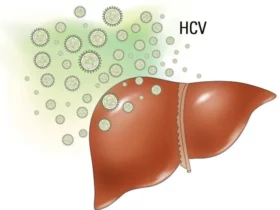



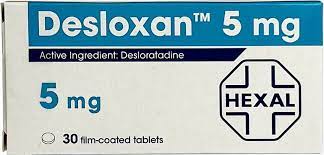
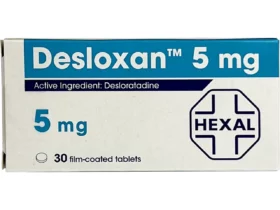
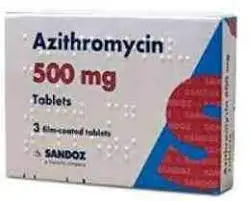

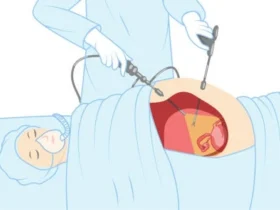
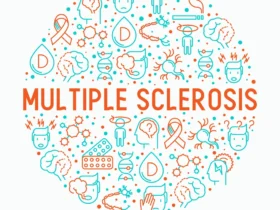


Leave a Reply